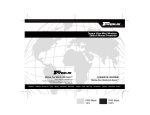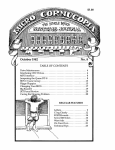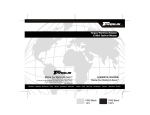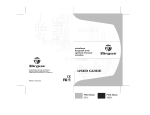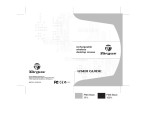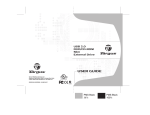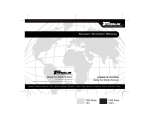Download Targus Multi-Channel Mouse Mouse User Manual
Transcript
Wireless Multi-Channel Mouse Visit our Web site at: www.targus.com Features and specifications are subject to change without notice. © 2003 Targus Corp. USER’S GUIDE 400-0116-001C BRUSSELS HANNOVER BARCELONA TOKYO MILANO AMSTERDAM SINGAPORE LONDON PARIS NEW YORK LOS ANGELES TORONTO HONG KONG SYDNEY TARGUS WIRELESS MULTI-CHANNEL MOUSE Introduction Congratulations on your purchase of a Targus Wireless MultiChannel Mouse. This ergonomically designed mouse uses leading-edge radio frequency (RF) technology that enables you to use the mouse anywhere up to three feet of its receiver, in a 360 degree range of operation. No line-of-sight between the mouse and its receiver is required. This mouse also features ten communication channels with automatic channel-hopping capability. This feature reduces the likelihood of interference from other RF devices. Using multichannels make it ideal for use in areas where more than one RF device is used, such as a conference room or office area. NOTE: This mouse is a high resolution device. For maximum accuracy and efficiency, it is recommended that you set your display resolution to 1024 x 768 pixels or higher while you are using the mouse. Packaging Contents In addition to this user’s guide, this package contains: • Mouse • Receiver • USB charge cable • Three inch USB extension cable 2 Targus Wireless Multi-Channel Mouse System Requirements To use the mouse, your computer must meet the following hardware requirements and run one of the operating systems listed below. Hardware • PC with an Intel® Pentium® processor or equivalent • USB interface Operating System • Windows® 98/98SE/Me/2000/XP NOTE: The third button and the scrolling wheel only work with the operating systems listed above. If you use the mouse with a different operating system, it will lose its enhanced features and function as a standard, two-button mouse. Charging the Mouse This mouse comes with a non-replaceable Lithium polymer battery. If properly maintained, the battery will last for as long as you own the mouse. For best results, you should charge the mouse at least 14 hours before using it. You can do this via the supplied USB charge cable. To do this: 1 Connect the cable’s USB connector into an available USB port on your computer 2 Connect the other end to the mouse. NOTE: To continuously charge the mouse via the USB charge cable, your computer must be on and awake. For best results, turn off your computer’s power management feature while charging the mouse. 3 Targus Wireless Multi-Channel Mouse Low Battery Indicator Light When the battery charge is running low, the LED on the scroller wheel glows. NOTE: If the indicator light is glowing, it is highly recommended that you charge the mouse as soon as possible to properly maintain the battery. Once the indicator light starts glowing, the mouse’s internal controller begins monitoring the battery’s voltage level. When this level reaches its lowest point, depending on how often you use the mouse, the mouse enters power off mode. To power on the mouse, fully charge the battery then press the mouse’s connect button to resume normal operation. Connecting the Mouse Receiver To connect the mouse receiver: 1 Turn off your computer. 2 Plug the USB receiver into an available USB port on your computer. 3 Turn on your computer and follow any on-screen instructions to complete the default driver installation. Establishing a Communications Link NOTE: For best results, place the mouse close to the receiver when establishing a communications link, to avoid possible interference from other RF devices. 4 Targus Wireless Multi-Channel Mouse After your computer detects the USB receiver and the driver software is installed, you must establish a communications link between the mouse and its receiver BEFORE you can use the mouse. To establish this link, you need to set the identification code so that the mouse works properly. To do this: 1 Press and release the link button on the receiver. Link button Sample receiver The receiver’s status light blinks when the receiver is activated. 2 Press and release the connect button, located on the bottom of the mouse. Connect button Sample mouse bottom The mouse’s light emitter diode (LED) stops glowing when you press the connect button and resumes glowing when the button is released. When the communication link is established, the receiver’s status light turns off. You are now ready to use the mouse. 5 Targus Wireless Multi-Channel Mouse Mouse Power Management Powering the Mouse Off and On To power the mouse off, move the on/off switch to the off position. To turn it back on, move the switch back to the on position. Power Save Modes To conserve the battery, the mouse reduces its power consumption gradually when not in use, via power saving modes, as follows: Standby mode When the mouse stops moving, it immediately enters standby mode. It stays in this mode for 30 seconds if movement isn’t detected. Flash mode After 30 seconds of non-operation, the mouse enters flash mode. It stays in this mode for 20 minutes if movement isn’t detected. While in flash mode, the mouse’s optical sensor turns off and on intermittently to not only conserve battery power, but allow the user prompt access to the cursor if movement is resumed. Sleep mode After 20 minutes of non-operation, the mouse enters sleep mode and turns off the optical sensor. You must wake the mouse to resume normal operation from this mode. 6 Targus Wireless Multi-Channel Mouse Waking the Mouse To wake the mouse from sleep mode, press any button on the mouse to resume normal operation. Operating Hints For optimal performance and RF reception: • Turn off your computer’s power management feature before charging the mouse so that your computer doesn’t enter sleep mode, which temporarily haults the charging process. • Place the receiver at least 8 inches (20 cm) away from all electrical devices, such as your monitor, speakers or external storage devices. If necessary, use the three-inch extension cable to keep the receiver away from the computer. Plug the receiver into the extension cable, and the extension cable to the computer. • Avoid using the mouse on a metal surface. Metals, such as iron, aluminum or copper, shield the radio frequency transmission and may slow down the mouse’s response time or cause the mouse to fail temporarily. • The mouse will enter a suspend mode at the same time your computer does. To activate the mouse, press any button. • If your computer has a metal case that contains aluminum or magnesium, use the mouse to the side. The display panel may interfere with the radio frequency signal if you use the mouse directly in front of the computer. • Never use the mouse on a glass or mirrored surface as these surfaces will cause the mouse to fail temporarily. • To maximize battery life, use the mouse on a white, or light colored surface. Dark surfaces cause the mouse’s light 7 Targus Wireless Multi-Channel Mouse emitter diode (LED) light to glow brighter, which causes the battery to discharge more rapidly. Comfortable Usage Research suggests that physical discomfort and injury to nerves, tendons, and muscles may be related to repetitive motion, an improperly set up work area, incorrect body posture, and poor work habits. To reduce the risk of injury, follow these precautions: • Stand, stretch, and move around several times every hour. • Switch hands while performing tasks. Use shortcut keys to avoid repetitive or awkward mouse movements. • Relax your shoulders and keep your elbows at your sides. Adjust the keyboard’s position so that you don’t have to stretch to reach it. • Adjust your position so that you don’t have to bend your wrists to type; avoid placing your wrists on a sharp edge. If you feel discomfort or numbness in your hands, wrists, arms, shoulders, neck, or back while typing, consult a qualified medical professional. Things to Remember Batteries • To extend the life of your batteries, turn off the mouse while traveling. Sleep Mode • The mouse’s sleep mode feature activates after 20 minutes of non-operation. To wake the mouse from sleep mode, press any button. 8 Targus Wireless Multi-Channel Mouse Specifications Button Count 3 with scrolling wheel ID Selections 256 Number of Channels 10 with automatic detect and switching channels Hardware Resolution 800 dpi Electromagnetic CE - Type acceptance: ETS 300 220 short Characteristics (EMC) range devices Distance Between Mouse and Receiver 3 feet (0.91 m) Mouse Carrier Frequency 27 MHz ISM band Dimensions Mouse: 3.5 x 2.05 x 1.38 inches (89.5 x 52.1 x 35 mm) Receiver: 2.5 x 0.86 x 0.67 inches (63 x 22 x 17 mm) Weight Mouse (without batteries): 3.38 ounces (96 grams) Receiver: 0.56 ounces (16 grams) Receiver Interface USB version 1.1 Operating Voltage Mouse: 3.7V DC (powered by battery) Receiver: 4.5 to 5.5V DC (powered by the USB port) 9 Targus Wireless Multi-Channel Mouse Batteries 1 internal lithium polymer Operating Current Mouse: 35mA or lower Receiver: 30mA (typical) (100mA maximum) Mouse Standby Current 4.5 mA (for 30 seconds of non-operation) Mouse Flash Mode Current Below 2.8mA (for 20 minutes of nonoperation) Mouse Sleep Mode Current Below 8µA Modulation Type FSK Transmission Rate 5K bps Transmission Type Digital radio frequency Error Detection 8-bit CRC Troubleshooting What do I do if the mouse does not work? • Make sure that the mouse is fully charged. • Verify that your computer’s power management feature is turned off. • Check that the receiver’s USB connector is firmly attached to the USB port on your computer. • Make sure you have established a radio link between the mouse and its receiver. See “Establishing a Communications Link” on page 4. 10 Targus Wireless Multi-Channel Mouse When I use the mouse, other wireless devices work more slowly or fail temporarily – what should I do? The mouse has ten channels and 256 identity codes per channel to prevent interference. However, some interference may still occur if there are multiple radio-based devices that operate at 27 MHz, such as a telephone, baby monitor, or toy. To reduce interference, move the mouse’s receiver and the base unit of the affected device as far away from each other as possible. What do I do if the response time of the mouse is slow or the mouse intermittently stops working? • Increase the distance between the mouse’s receiver and the rest of your computer equipment. • Increase the distance between the mouse’s receiver and the base units of other wireless devices. • Turn off any wireless devices and their base units that are near the mouse’s receiver. • If you are using the mouse on a metal surface, move it and the receiver to a non-metal surface. Metals, such as iron, aluminum or copper, shield the radio frequency transmission and may slow down the mouse’s response time or cause the mouse to fail temporarily. I can’t use the mouse while another RF mouse is in use – what should I do? Reset the identification code. See “Establishing a Communications Link” on page 4 11 Targus Wireless Multi-Channel Mouse Technical Support For technical questions, please visit: Internet: http://www.targus.com/support.asp Australia Internet: www.targus.com.au Email: [email protected] Monday through Friday, 8:30 a.m. (08:30) to 5:30 p.m. (17:30) Eastern time: 1-800-641-645 Canada Monday through Friday, 9:00 a.m. (09:00) to 5:00 p.m. (17:00) Eastern time: 888-827-4877 Europe Belgium +32 0 02-717-2451 Denmark +45 0 35-25-8751 France Germany +33 0 1-64-53-9151 +49 0 21-16-579-1151 Italy +39 0 24-827-1151 Netherlands +31 0 20-504-0671 Spain +34 0 91-745-6221 Sweden +46 0 8-751-4058 Switzerland +41 0 1-212-0007 United Kingdom Eastern Europe & others +44 0 20-7744-0330 +31 0 53-484-9479 12 Targus Wireless Multi-Channel Mouse Product Registration For more efficient customer service and to activate the product’s warranty, Targus recommends that you register your Targus accessory shortly after purchasing it. To register your Targus accessory, go to: http://www.targus.com/registration.asp You will need to provide your full name, email address, phone number, and company information (if applicable). Warranty Targus warrants this product to be free from defects in materials and workmanship for one year. If your Targus accessory is found to be defective within that time, we will promptly repair or replace it. This warranty does not cover accidental damage, wear and tear, or consequential or incidental loss. Under no conditions is Targus liable for loss of, or damage to a computer; nor loss of, or damage to, programs, records, or data; nor any consequential or incidental damages, even if Targus has been informed of their possibility. This warranty does not affect your statutory rights. Warranty Registration at: http://www.targus.com/registration.asp Regulatory Compliance This device complies with Part 15 of the FCC Rules. Operation is subject to the following two conditions: (1) This device may not cause harmful interference, and (2) This device must accept any interference received, including interference that may cause undesired operation. FCC Statement Tested to Comply This equipment has been tested and found to comply with the limits of a Class B digital device, pursuant to Part 15 of the FCC Rules. These limits are designed to provide reasonable protection against harmful interference in a residential installation. This equipment generates, uses, and can radiate radio frequency energy and if not installed and used in accordance with the instructions, may cause harmful interference to 13 Targus Wireless Multi-Channel Mouse radio communications. However, there is no guarantee that interference will not occur in a particular installation. If this equipment does cause harmful interference to radio or television reception, which can be determined by turning the equipment off and on, the user is encouraged to try to correct the interference by one or more of the following measures: • Reorient or relocate the receiving antenna • Increase the separation between the equipment and receiver • Move the computer away from the receiver • Connect the equipment into an outlet on a circuit different from that to which the receiver is connected. Intel and Pentium are registered trademarks of Intel Corporation. Windows is a registered trademark of Microsoft Corporation. All other trademarks are the property of their respective owners. 14















